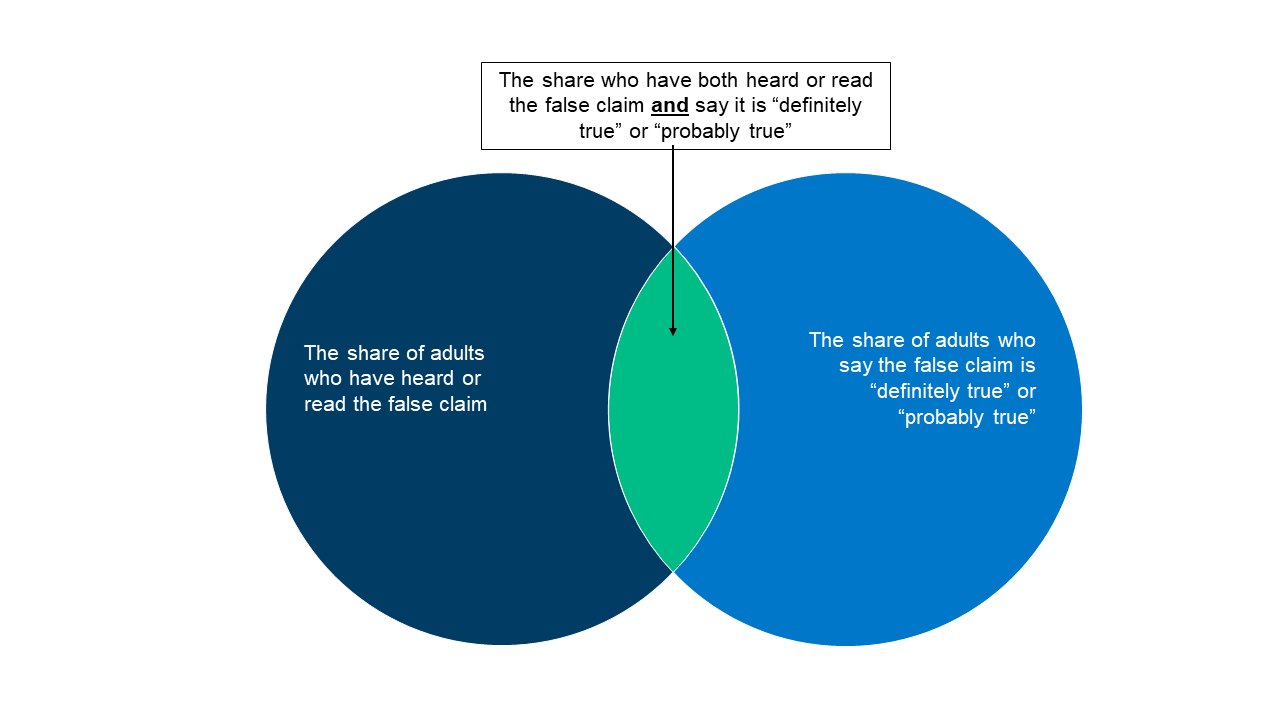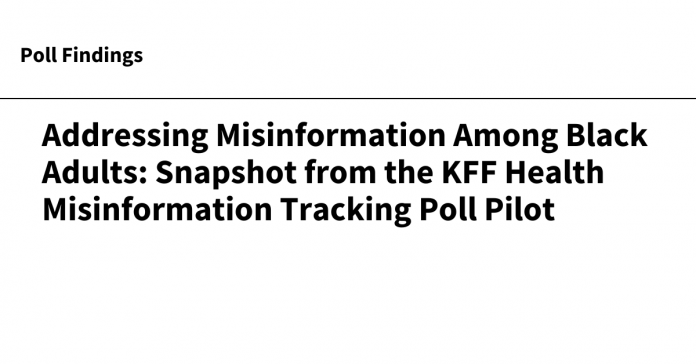The independent source for health policy research, polling, and news.
The independent source for health policy research, polling, and news.
Audrey Kearney, Lunna Lopes, Irving Washington, Isabelle Valdes, Hagere Yilma, and Liz Hamel
Published:
The KFF Health Misinformation Tracking Poll Pilot examines U.S. adults’ use of and trust in different media sources and their exposure to and belief in a series of health-related misinformation claims, including false statements related to COVID-19 and vaccines, reproductive health, and firearm safety. The Health Misinformation Tracking Poll will work in tandem with KFF’s forthcoming Health Misinformation Monitor, a detailed report of the landscape of health misinformation messages circulating among the public, probing the impact of misinformation documented in the monitor to help inform and strengthen efforts aimed at addressing misinformation in health. Both the Misinformation Tracking Poll and the Monitor are part of a new program on health misinformation and trust being developed at KFF. This snapshot from our initial pilot poll provides a look at the survey results among Black adults1 and their implications for addressing health-related misinformation among this community. Other snapshot reports provide similar insights into addressing misinformation among Hispanic adults and among rural residents. These snapshot reports are aimed at helping organizations in the U.S. working to combat health-related misinformation and rebuild trust in the media, public health, and scientific communities.
While notable shares of Black adults are coming across health-related misinformation, relatively few are buying into specific false claims about COVID-19, reproductive health, and firearm violence and safety examined in the KFF Misinformation Tracking Poll Pilot. Similar to adults overall, only small shares of Black adults (15% or less) are convinced that specific items of misinformation asked about in the poll are “definitely true.” Somewhat larger shares (between 14% and 36%) reject these misinformation items as “definitely false,” yet most Black adults are in a middle group that express some uncertainty saying these false claims or “probably true” or “probably false.”
Between one in five and three in five Black adults have heard each of the pieces of health misinformation included in the survey. The most commonly heard items are that “COVID-19 vaccines have caused thousands of sudden deaths in otherwise healthy people,” “Sex education that includes information about contraception and birth control increases the likelihood that teens will be sexually active,” and “Most gun homicides in the U.S. are gang related.” Exposure to specific claims of health misinformation varies by age, gender, and education, with young Black adults and college educated Black adults being more likely to have heard pieces of COVID-19 misinformation.
Regardless of whether they have heard or read specific items of misinformation, the survey also asked people whether they think each claim is definitely true, probably true, probably false, or definitely false. For most of the misinformation items included in the survey, between three in ten and half of Black adults say they are “definitely” or “probably true.” Combining these measures, smaller shares of Black adults (between one in ten and one-third) both have heard each claim and believe it is probably or definitely true.
Measures of Health Misinformation
This report examines three measures of health misinformation among the public. Adults were asked whether they had heard or read specific, false health-related statements. Regardless of whether they have heard or read specific items of misinformation, all were asked whether they thought each claim was definitely true, probably true, probably false, or definitely false. We then combined these two measures to examine the share who have heard the false claims and believe it is definitely or probably true.
Large shares of Black adults express uncertainty about the truthfulness of the false claims tested in the survey, with majorities saying each is either “probably true” or “probably false.” Small shares – about one-third or fewer – recognize any of the claims as “definitely false,” and fewer than one in five say that any of these claims are “definitely true.” Black adults without a college degree are particularly likely to express uncertainty about many of these claims.
The figures below show the shares of Black adults by age group and education level who believe each of the false claims is definitely or probably true. Generally, younger Black adults and those without a college degree are more likely than their older and college educated counterparts to say each of the items of misinformation examined in the survey are definitely or probably true.
Notably, about half of Black women of reproductive age (ages 18-49) say it is probably or definitely true that using hormonal birth control makes it harder for most women to get pregnant after ceasing birth control use. Older Black women lean more towards saying the statement is false, though just 15% of Black women ages 50 and older say the statement is “definitely false,” and nearly half (46%) say it is “probably false.”
Most Black parents are unsure about some of the misinformation items examined in the survey related to children, teens, and schools, with majorities saying it is “probably true” or “probably false” that armed school guards have been proven to prevent school shootings, that the MMR vaccines cause autism in children, and that sex education that includes information about contraception increases the likelihood that teens will be sexually active. One in four Black parents say the final claim is “definitely false.”
Television is the most commonly reported medium for news consumption among Black adults ages 35 and over, with large majorities saying they regularly watch local news and national network news, and more than half saying they are regular viewers of CNN and MSNBC. Among younger Black adults, seven in ten say they regularly use digital news aggregators that draw on multiple news sources, and more than half report regularly watching various TV news sources.
Social media use, not surprisingly, varies by age among Black adults as well. A majority of Black adults across age groups report using Facebook and YouTube at least once per week, but larger shares of Black adults under age 35 say they regularly use Instagram (79%), TikTok (62%), Snapchat (49%) and Twitter (41%) compared to their older counterparts.
Regardless of preferred social media platform, many (62%) Black adults say they use social media at least once a week to keep up-to-date on news and current events. This rises to seven in ten Black adults under age 35. One-third of Black adults also say they use social media at least weekly to find health information and advice. Younger Black adults and those without a college degree are more likely than their counterparts to use social media for health advice and information.
Doctors with personal relationships are the most trusted sources of health information for Black adults, with the vast majority saying they trust their doctor a great deal or a fair amount to make the right recommendations when it comes to health issues. Notably, a majority of Black adults have at least “a fair amount” of trust in the CDC, FDA, Biden administration, and state and local public health officials to make the right health recommendations. Fewer Black adults (22%) have at least a fair amount of trust in former President Donald Trump to make the right recommendations on health issues.
There are a range of sources that Black adults find at least somewhat trustworthy when it comes to health information. Majorities say they would trust health information at least a little if it was reported by most TV news sources asked about in the survey, including local and network news, CNN, MSNBC, and Fox News. At least half also say they would trust health information reported in their local newspaper, the New York Times, Wall Street Journal, or NPR. While no source garners “a lot” of trust from a majority of Black adults, at least one-third say they would trust health information “a lot” if it were reported by their local TV news station, national network news, or CNN.
Despite high use of social media platforms, fewer than one in five say that they would have “a lot of trust” in information related to health if they saw it on these platforms. Notably, however, majorities say they would trust health information at least a little if they saw it on Facebook or YouTube, and about four in ten or more say the same about Instagram, Twitter, and TikTok.
Looking at trust in news and social media sources among Black adults across age groups, local TV news stations and network news rank among the highest for trust in health information. However, across the board, few young Black adults say they would have “a lot” of trust in the health information from any source. Despite high use of social media among younger adults, Black adults under age 35 are more likely to say they would have “a lot” of trust in the health information they may come across on various traditional news sources than social media platforms such as YouTube (21%), TikTok (16%), Instagram (13%), and Twitter (13%).
Support for this work was provided by the Robert Wood Johnson Foundation (RWJF). The views expressed do not necessarily reflect the views of RWJF. KFF maintains full editorial control over all of its policy analysis, polling, and journalism activities.
Follow KFF
KFF Headquarters: 185 Berry St., Suite 2000, San Francisco, CA 94107 | Phone 650-854-9400
Washington Offices and Barbara Jordan Conference Center: 1330 G Street, NW, Washington, DC 20005 | Phone 202-347-5270
www.kff.org | Email Alerts: kff.org/email | facebook.com/KFF | twitter.com/kff
The independent source for health policy research, polling, and news, KFF is a nonprofit organization based in San Francisco, California.
[td_block_social_counter facebook="tagdiv" twitter="tagdivofficial" youtube="tagdiv" style="style8 td-social-boxed td-social-font-icons" tdc_css="eyJhbGwiOnsibWFyZ2luLWJvdHRvbSI6IjM4IiwiZGlzcGxheSI6IiJ9LCJwb3J0cmFpdCI6eyJtYXJnaW4tYm90dG9tIjoiMzAiLCJkaXNwbGF5IjoiIn0sInBvcnRyYWl0X21heF93aWR0aCI6MTAxOCwicG9ydHJhaXRfbWluX3dpZHRoIjo3Njh9" custom_title="Stay Connected" block_template_id="td_block_template_8" f_header_font_family="712" f_header_font_transform="uppercase" f_header_font_weight="500" f_header_font_size="17" border_color="#dd3333"]





